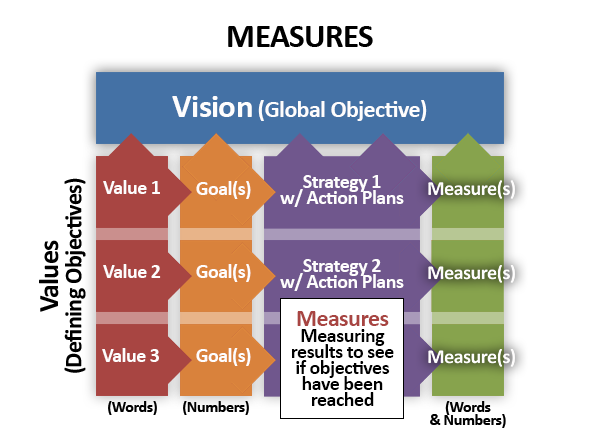Clarify the Win
 Measuring what you do is the only way you know you’re accomplishing something important. It’s how you clarify the win and know what success looks like in every area of your life.
Measuring what you do is the only way you know you’re accomplishing something important. It’s how you clarify the win and know what success looks like in every area of your life.
Consider how often you start a task or set a goal without defining a strategic way to measure the preferred outcome. Sometimes it’s a simple oversight. At other times, we don’t measure because we fear the result won’t be what we expect it to be.
It’s also true that we can have shifting definitions of success. When something doesn’t go as planned, we may be tempted to redefine the win and rationalize an unexpected (and non-vision-driven) outcome.
The right measures clarify the win and combat vision drift and misalignment in 2 strategic ways:
- They focus on outputs vs. inputs. Inputs tell you what ingredients go in to something. Outputs tell you what comes out on the other side. Move beyond simple input measures to the more significant outcomes you’re aiming for.
- They measure quantitative vs. qualitative success. Qualitative measures are subjective and experiential. Quantitative measures, or metrics, are objective and numerical. In most cases, quantitative measures are the best way to measure outcomes without bias.
Remember that measures aren’t goals. Measures are an objective way to express the size, quantity or degree of something. Goals are a numerical objective and desired result for the measures you set. Both are important, but goals won’t mean much if you don’t measure the right things.
Clarify the win in 5 quick steps:
- Define success with measurable outcomes (metrics). Measure with quantitative and objective outcomes. Use unambiguous metrics to paint a clear picture of action plan results.
- Select the right measures. Align measures with organizational vision and values. Think beyond inputs to outputs.
- Record the results. Devote time to evaluating and measuring your plans. If you complete a task or goal, plan some time to compare it against the strategic measures you set.
- Track data trends. Trends show where you are in relation to your past and can be a predictor of future growth (or decline). Read measures intelligently and watch for important trends indicating health, effectiveness and relevance.
- Make measures-driven adjustments. Honest measures indicate one of two things. Either you’ve accomplished your goal or you haven’t. Either you’re moving in an upward trend or you’re not. Make adjustments based on measured results.
Clarify the win. Measuring what you do is the only way you know you’re accomplishing something important.
Is It Working?
The key question is whether or not your ministry action plan is working. For most churches the answer is a mixture of yes and no. Some ministries, action plans and strategies will work and some won’t. Build on ministry success and commit to adjust strategies and plans that fail to get you where you need to go.
Ask a few simple questions:
- How do you know your strategy is working?
- What does success look like for each strategy?
- How do you measure success numerically for each strategy and plan?

Lead & Lag Measures
Every goal needs a measuring stick, but not just any measuring stick. Placing your focus on the right measure is one of the most important things you can do to improve execution.
What’s the difference between lead and lag measures? Here’s a quick definition:
- Lead Measure – Something that leads to the goal
- Lag Measure – Something that measures the goal
The key idea is to take weekly stock of several lead measures, then show the lag measure they impact.
Over time, positive movement in the lead measures should impact the lag measure in the right direction (attendance, participation, etc.).
Take a look at some lead and lag measure examples:
- Worship
- Lead Measure – Invite Cards Distributed
- Lag Measure – Worship Attendance
- Community
- Lead Measure – New Groups Started
- Lag Measure – Groups Attendance
- Service
- Lead Measure – New People Mobilized
- Lag Measure – Missions Participation
- Evangelism
- Lead Measure – Gospel Conversations
- Lag Measure – Baptisms